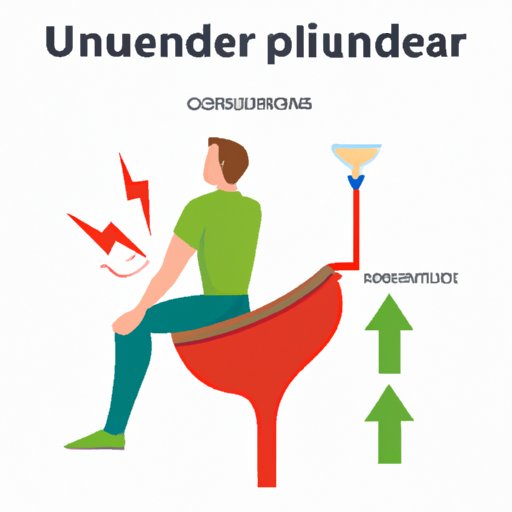I. Introduction
Frequent urination can be a frustrating problem that affects many people. Whether it’s waking up several times during the night to use the restroom or feeling like you need to go every few minutes, it can take a toll on your quality of life. In this article, we will explore the causes of frequent urination, how to determine if you have an overactive bladder, and what dietary changes you can make to help alleviate symptoms. Additionally, we’ll provide information on when it’s important to seek medical attention and what to expect during a visit to the doctor.
II. The Science of Frequent Urination: Understanding the Causes and Solutions
Frequent urination is defined as the need to urinate more than seven times a day or waking up more than once a night to use the restroom. Normal voiding frequency can vary based on age, gender, and overall health. For most healthy adults, urination frequency is usually between four to seven times per day. Several factors can lead to frequent urination such as infection, overactive bladder, nerve damage, and others. For instance, urinary tract infections (UTIs) are a common cause of frequent urination in both men and women. Overactive bladder is another common cause that typically affects women more commonly than men. Treatment for frequent urination depends on the underlying condition, with options ranging from medication to behavioral therapy and surgery.
III. Are You Peeing Too Much? How to Determine if You Have Overactive Bladder
If you feel like you’re constantly running to the bathroom, you may have an overactive bladder (OAB). OAB is a common condition that affects millions of people. Symptoms of OAB include sudden urges to urinate, needing to go frequently, and possibly even leaking urine. To determine if you have OAB, your doctor will perform various diagnostic tests, such as a urinalysis or urodynamic testing. Additionally, bladder training exercises can help manage symptoms of OAB along with lifestyle changes such as reducing caffeine intake and limiting fluids before bedtime.
IV. Breaking Down the Causes of Frequent Urination in Men vs. Women
Although men and women share some of the same risk factors for frequent urination, it’s essential to note that some factors impact each gender differently. Men are more likely to experience frequent urination caused by an enlarged prostate gland called benign prostatic hyperplasia (BPH). On the other hand, women who have been pregnant are more likely to experience urinary incontinence. Furthermore, hormonal changes can cause frequent urination during menopause. Regardless of gender, practicing good pelvic floor health practices can help manage symptoms of frequent urination.
V. Could Your Diet Be Causing You to Urinate More Often?
Caffeine, alcohol, and spicy or acidic foods may be the root cause of the frequent urgency to urinate. By identifying and eliminating problematic foods, you can lessen your urge to urinate. Also, eating high-fiber foods helps to keep the digestive system functioning correctly, promoting a routine bowel movement. Constipation symptoms can exacerbate frequent urination. Adequate hydration also plays a significant role in urinary tract health. Drinking enough water helps to flush out bacteria and toxins from the urinary tract, reducing the risk of infection and guarding against kidney stone formation.
VI. What Your Urine Can Tell You About Your Health: A Guide to Identifying Symptoms
Urine color, odor, and transparency can all give you a hint about your health condition. Cloudy urine is often a sign of a urinary tract infection. It could also be an indication of a kidney stone or other blockage. Meanwhile, darker urine is usually a sign that you need to drink more fluids, while dark red or brown urine can be an indication of an underlying health condition. Additionally, odor changes may indicate you have a medical issue, often a urinary tract infection. See a doctor immediately if you notice an abnormal odor in your urine
VII. Natural Remedies for Overactive Bladder: Tips and Tricks for Reducing Urination Frequency
Several natural remedies can be beneficial in reducing frequent urination, such as yoga, kegel exercises, and herbal supplements. Yoga and other relaxation techniques can reduce anxiety, which can help with bladder control. Kegel exercises strengthen the pelvic floor muscle and improve bladder control. Moreover, herbal supplements such as pumpkin seed extract and corn silk can help to alleviate the symptoms of an overactive bladder. However, always speak with your doctor before using any herbal supplement to ensure they do not interact with your other medications.
VIII. When to See a Doctor for Frequent Urination: Warning Signs and Next Steps
It’s essential to speak with your doctor if you experience symptoms of frequent urination, including burning or painful urination, fever, unusual discharge, or blood in your urine. Your doctor will perform several diagnostic tests such as a urinalysis, urine culture, and blood tests. Depending on the underlying cause of your symptoms, your doctor may prescribe medication, behavioral therapy, or surgery.
IX. Conclusion
Frequent urination may be an irritating problem, but it’s essential to understand that it’s often treatable. With lifestyle changes, natural remedies, and medical treatment options, you can manage your symptoms effectively. Importantly, seek medical attention if your symptoms are severe or if you have any warning signs.
